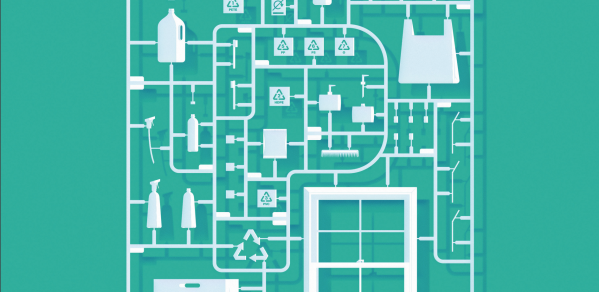
Plastics are ubiquitous in modern society, owing to their usefulness, durability and how cheap and easy they are to produce. This makes plastics both a blessing and a curse.
Fixing this problem is not simple. Even finding good data, on the production, use, disposal and recycling of plastics is challenging.
A report entitled The 'P' Word has been published by The Resource Efficiency Collective. It focuses on use of plastics in the UK. We manufacture a myriad of plastic materials, used in countless consumer products, which are highly valued by society. Everything from milk cartons to window frames, from sunglasses to face masks, contains plastic. Plastics are pervasive due to their practicality and profitability.
However, our modern production processes, use and disposal of plastics create challenging pollution issues, from the release of CO2 emissions to plastic waste found in waterways and oceans.
Fixing this problem is not simple. Even finding good data, on the production, use, disposal and recycling of plastics is challenging.
This report by Jonathan Cullen, Michal Drewniok and André Cabrera Serrenho tackles the data problem by mapping plastic flows through UK society, collating data from disparate sources on the production, use, disposal and recovery of plastics. With the resulting map of UK plastic flows, we can understand the latest trends in plastics use and identify opportunities for reducing the impacts of plastics in the future.
The authors found that the way we have been disposing of plastics plays a critical role in two serious environmental impacts: greenhouse gas emissions and plastic ocean pollution. These problems arise because plastics are not circular in the UK. Less than 3% of plastics consumed are made of UK recycled plastics, and the vast majority of waste ends up being incinerated, landfilled or exported. Without any action this problem will get worse, as we will generate more plastic waste in coming decades from all the products made of plastic that we have been accumulating.
Recycling more plastics in the UK could reduce incineration emissions, avoid mismanagement of exported waste and replace the need for the production of new plastics. However, current UK recycling capacity is only 12% of waste collected, and this is hampering the benefits recycling could provide.
There are several other actions we should take, such as reducing excessive use of plastic packaging, and reducing the range of polymers used in various products to improve recycling yields. These should be combined with improved practices in the petrochemical industry, and enhanced reuse and recycling of plastics to achieve a meaningful reduction in greenhouse gas emissions.
The authors of the report, Jonathan Cullen, Michal Drewniok & André Cabrera Serrenho, are members of the Cambridge Creative Circular Plastics Centre (CirPlas). The Centre acts as a nucleus for a global network of partners and coordinates a range of research projects, workshops and forums to tackle contemporary challenges from the manufacturing of more sustainable materials to driving innovations in plastic recycling.

